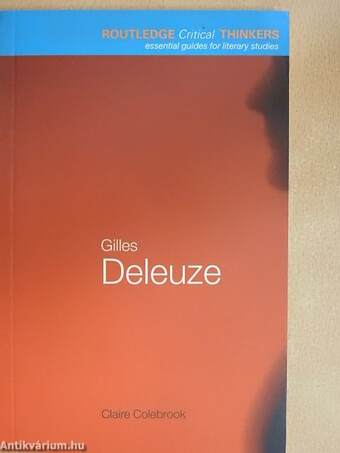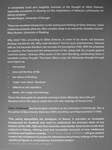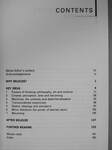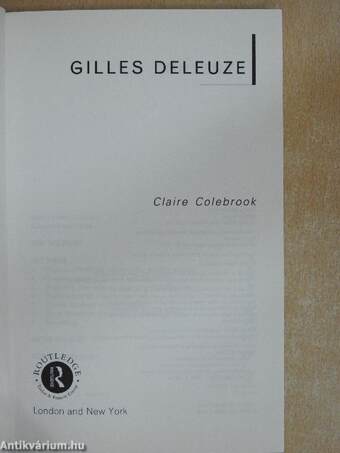1.072.878
kiadvánnyal nyújtjuk Magyarország legnagyobb antikvár könyv-kínálatát

VISSZA
A TETEJÉRE
JAVASLATOKÉszre-
vételek
Gilles Deleuze
| Kiadó: | Routledge |
|---|---|
| Kiadás helye: | London |
| Kiadás éve: | |
| Kötés típusa: | Ragasztott papírkötés |
| Oldalszám: | 170 oldal |
| Sorozatcím: | Routledge Critical Thinkers |
| Kötetszám: | |
| Nyelv: | Angol |
| Méret: | 20 cm x 13 cm |
| ISBN: | 0-415-24634-2 |
naponta értesítjük a beérkező friss
kiadványokról
naponta értesítjük a beérkező friss
kiadványokról
Fülszöveg
'A remarkably lucid and insightful overview of the thought of Gilles Deleuze, especially successful in drawing out the implications of Deleuze's philosophy for literary analysis.'
Ronald Bogue, University of Georgia
This is an excellent introduction to the writing and thinking of Gilles Deleuze. Claire Colebrook presents what are often complex ideas in an eminently readable manner.' Mary Bryden, University of Reading
Why think? Not, according to Gilles Deleuze, in order to be clever, but because thinking transforms life. Why read literature? Not for pure entertainment, Deleuze tells us, but because literature can recreate the boundaries of life. With his emphasis on creation, the future and the enhancement of life, along with his crusade against 'common sense', Deleuze offers some of the most liberating, exhilarating ideas in twentieth-century thought. This book offers a way into Deleuzean thought through such topics as:
'becoming'
time and the flow of life
the ethics of... Tovább
Fülszöveg
'A remarkably lucid and insightful overview of the thought of Gilles Deleuze, especially successful in drawing out the implications of Deleuze's philosophy for literary analysis.'
Ronald Bogue, University of Georgia
This is an excellent introduction to the writing and thinking of Gilles Deleuze. Claire Colebrook presents what are often complex ideas in an eminently readable manner.' Mary Bryden, University of Reading
Why think? Not, according to Gilles Deleuze, in order to be clever, but because thinking transforms life. Why read literature? Not for pure entertainment, Deleuze tells us, but because literature can recreate the boundaries of life. With his emphasis on creation, the future and the enhancement of life, along with his crusade against 'common sense', Deleuze offers some of the most liberating, exhilarating ideas in twentieth-century thought. This book offers a way into Deleuzean thought through such topics as:
'becoming'
time and the flow of life
the ethics of thinking
'major' and 'minor' literature
- difference and repetition
desire, the image and ideology.
This is the ideal guide for students wishing to think differently about life and literature and in this way to create their own new readings of literary texts.
Claire Colebrook
teaches English Literature at the University of Edinburgh. She is the author of New Literary Histories (1997) and Ethics and Representation (1999).
'This series demystifies the demigods of theory. It provides an invaluable background for students who want to understand the principal ideas of key thinkers of the 19th, 20th and 21st centuries. Importantly, these books locate their subjects in history, offering lucid and accessible accounts of how intellectual practices and traditions emerge. Critical will give student
readers the confidence to pursue for themselves the primary writings of the most significant figures in contemporary theoretical studies.' Vissza
Témakörök
- Filozófia > Témaköre szerint > Filozófiatörténet > Tanulmányok
- Filozófia > Témaköre szerint > Esztétika (művészetfilozófia)
- Filozófia > Témaköre szerint > Egyéb
- Idegennyelv > Idegennyelvű könyvek > Angol > Művészetek > Film
- Idegennyelv > Idegennyelvű könyvek > Angol > Filozófia > Témaköre szerint > Filozófiatörténet > Tanulmányok
- Idegennyelv > Idegennyelvű könyvek > Angol > Filozófia > Témaköre szerint > Esztétika (művészetfilozófia)
- Művészetek > Film > Filmesztétika
- Művészetek > Film > Idegen nyelv > Angol
- Idegennyelv > Idegennyelvű könyvek > Angol > Filozófia > Témaköre szerint > Egyéb









